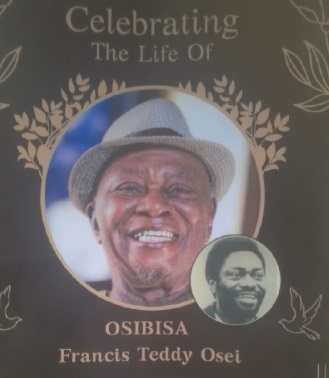Ghana has laid to rest one of its most revered musical legends, Francis Kwabena “Teddy” Osei, founder and leader of the internationally acclaimed Afro-rock band Osibisa.
The final funeral rites and burial took place on Saturday, April 5, 2025, at his family residence in Chiriapatre, Kumasi, with a solemn mass held at St. Peter’s Cathedral Basilica near Fante Newtown.
Teddy Osei, born on December 17, 1935, passed away after decades of trailblazing musical success that brought African rhythms to global stages.
The funeral was attended by family, friends, fellow musicians, cultural stakeholders, and admirers who came to celebrate a man whose saxophone and voice helped pioneer a new era of Afro-pop music.
His widow, Benedicta Adu-Poku, delivered a heartfelt tribute, quoting lyrics from one of Osibisa’s iconic songs: “We are going, heaven knows where we are going,” and said the line continues to echo in her heart. She added, “If not on tour, he always made time for me and those were very precious times together. I will carry your love with me always, until we meet again.”
Teddy Osei’s journey began in Kumasi, where he was born to Roman Catholic parents Michael and Josephine Kyekyere. Named after the revered Ashanti King Osei Tutu I, he was the second of seven children.
His musical influence came early, thanks to his father’s involvement in a church band and exposure to local traditional music.
His school teacher introduced him to instruments like the bass drum, while frequent visits to the Ashanti Palace exposed him to folk music.
After a brief stint working in Sekondi, where he studied craftsmanship, Osei found himself drawn to modern music, influenced by Ghana’s socio-political atmosphere and the works of Dr. Kwame Nkrumah.
Though initially working as a building inspector, his passion led him to form “The Comets” with his brother Mac Tontoh.
The band, rooted in highlife, gained national recognition before Osei left for London in 1962 on a Ghana government scholarship to study music and drama.
His academic pursuit was cut short by political changes back home, but it did not stop his ambition. In 1969, he co-founded Osibisa with Sol Amarfio, Mac Tontoh, and other musicians from the African diaspora.
The band’s name, derived from “Osibisaaba,” a blend of palm wine music and traditional Fante rhythms, would become synonymous with a new global sound.
Osibisa was a pioneer of Afro-rock, combining African rhythms with jazz, funk, and rock. Despite humble beginnings in London—without a manager or agent—the band’s high-energy performances earned them instant acclaim.
They broke into the British top-ten charts with hits like “Woyaya,” “Sunshine Day,” and “Dance The Body Music.”
Their international influence grew in the 1970s and 1980s, as they toured India, Japan, Australia, New Zealand, and several African nations.
In 1980, they performed at the concert marking Zimbabwe’s independence—a testament to their symbolic role in pan-African unity and global Black identity.
Teddy Osei played multiple instruments, including the flute, drums, and saxophone, and was the band’s creative anchor. Though Osibisa’s popularity peaked decades ago, the band continues to perform, sustaining its legacy.
Teddy Osei is survived by his widow, three daughters—Matilda, Agnes, and Shanta—and several grandchildren and great-grandchildren.







